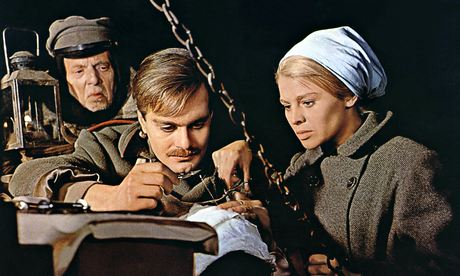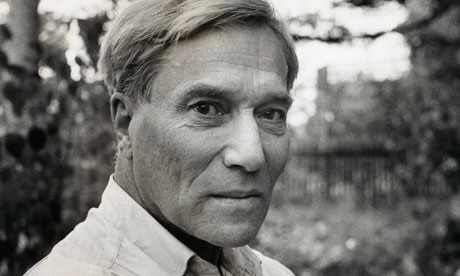
Alison Flood
Alison Flood is a writer on guardian.co.uk/books and former news editor of The Bookseller
Newly declassified documents reveal the CIA published Boris Pasternak's Nobel-winning novel to sow unrest among Soviets
'Propaganda value' … Omar Sharif and Julie Christie in the film version of Pasternak's classic novel Doctor Zhivago. Photograph: CineText/Sportsphoto/Allstar
More than 100 newly declassified documents in the US have revealed how the CIA printed Russian-language copies of Boris Pasternak's classic novel Doctor Zhivago during the cold war in an attempt to sow unrest among Soviet citizens.
The CIA documents reveal intriguing details about how Pasternak's epic love story of the life and romances of physician and poet Yuri Zhivago was printed in Russian and distributed to Soviet citizens by the intelligence agency in the late 1950s. They were obtained by Peter Finn and Petra Couvée, the authors of the forthcoming book The Zhivago Affair (out in June). The book lays out how Pasternak thought his novel would never be published in the Soviet Union because the authorities viewed it as "an irredeemable assault on the 1917 revolution", so he gave it to an Italian publishing scout, through whom it wended its way to publication in the west.
In an excerpt in the Washington Post, the authors detail how the CIA recognised the value of the novel as a literary weapon in the cold war.
"This book has great propaganda value, not only for its intrinsic message and thought-provoking nature, but also for the circumstances of its publication: we have the opportunity to make Soviet citizens wonder what is wrong with their government, when a fine literary work by the man acknowledged to be the greatest living Russian writer is not even available in his own country in his own language for his own people to read," runs one of the more than 130 newly declassified CIA documents.
Another, written by John Maury, head of the Soviet-Russia division, in July 1958, states that "Pasternak's humanistic message – that every person is entitled to a private life and deserves respect as a human being, irrespective of the extent of his political loyalty or contribution to the state – poses a fundamental challenge to the Soviet ethic of sacrifice of the individual to the Communist system".
The CIA published a hardback Russian-language edition of Doctor Zhivago in the Netherlands, and a miniature, paperback edition at its own headquarters – making sure that the "hand of the United Statesgovernment" was "not to be shown in any manner", reveal the documents. It then pressed copies into the hands of Soviet citizens at the 1958 Brussels Universal and International Exposition, while "agents who [had] contact with Soviet tourists and officials in the West" passed out the miniature edition.
The CIA also "provided elaborate guidelines for its officers on how to encourage western tourists to talk about literature and Doctor Zhivago with Soviet citizens they might meet", write Finn and Couvée in the Washington Post extract.

Russian author Boris Pasternak. Photograph: Jerry Cooke/Corbis
"We feel that Dr Zhivago is an excellent springboard for conversations with Soviets on the general theme of 'Communism versus Freedom of Expression,'" runs a 1959 memo. "Travellers should be prepared to discuss with their Soviet contacts not only the basic theme of the book itself – a cry for the freedom and dignity of the individual – but also the plight of the individual in the communist society."
One internal memo uncovered by Finn and Couvée sees the CIA recommend that Doctor Zhivago "be published in a maximum number of foreign editions, for maximum free world distribution and acclaim and consideration for such honour as the Nobel prize". Pasternak was awarded the Nobel prize in literature in 1958 for "his important achievement both in contemporary lyrical poetry and in the field of the great Russian epic tradition". He accepted the prize, but was later forced by authorities in Russia to decline it, according to the Nobel prize in literature.
Frances Stonor Saunders, author of Who Paid the Piper: The CIA and the Cultural Cold War, said that the fact that the CIA published and distributed thousands of books during the Cold War, including Doctor Zhivago, had long been known, but that "the difference is now that the CIA have agreed to talk to two writers and declassify 130 documents, which they say is the whole file".
Saunders questioned the timing of the CIA's decision to talk – "it works very well for American foreign policy to release this story now," she said – and criticised Finn and Couvée's failure to address Doctor Zhivago itself.
"There's a big question around the novel – Pasternak was writing quite deliberately, trying to position himself as the inheritor to Dostoevsky and Tolstoy. He was trying to write the great Russian novel, and the question of whether or not he succeeded is still very heavily contested," she said. "Many would argue it's actually a very boring novel – lots of people don't get to the end. There's another question, too, about how it has been positioned as an anti-Soviet novel – that's the propaganda bit."
Pasternak, she said, was not an anti-Soviet dissident. "He was actually in a very ambivalent position. Stalin called him a cloud dweller."
"I think the west, in the name of the best intentions, did exactly what it liked with Boris Pasternak. It was not interested in his destiny, his security, his liberty - it rode rough shod over that, through the auspices of the CIA," she said.
"The Soviets were aggressive and singularly uninterested in the freedom of authors, even Kruschev recognised this. The idea that Russian leaders are cultural thugs sits very comfortably with [US] foreign policy-makers and strategists today," she added. "The CIA only releases information when it is useful to them."



_jpg/250px-ElbeDay1945_(NARA_ww2-121).jpg)





